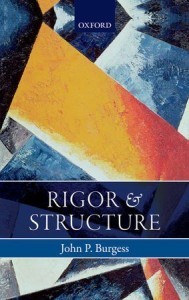Burgess, Rigor and Structure — 4
 [After a delay, let’s continue …!] In the second half of Chapter 2 of his book, Burgess first turns to discuss some opponents of the project of rigorization when conceived as the project of regimenting mathematics into standard set theory.
[After a delay, let’s continue …!] In the second half of Chapter 2 of his book, Burgess first turns to discuss some opponents of the project of rigorization when conceived as the project of regimenting mathematics into standard set theory.
We get a mixed bag of comments. For example, Burgess has a short section on opponents whose beef is with the distinctively classical nature of (post-)Cantorian set theory. It is perhaps enough to point to the obscurity of Brouwer’s intuitionistic critique to explain its early failure to win many adherents. Burgess then adds that “whatever the merits of [Dummett’s later defence of intuitionism], it came far too late, long after the mathematical community had made up its mind” (p. 82). Likewise, “it has transpired that much more of classical mathematics can be salvaged constructivistically [particularly, Bishop-style] than it originally appeared … [but this] came to be appreciated only too late, after the struggle was essentially over” (p. 85).
Now, these remarks gesture in a rather arm-waving way to something of the history leading to the de facto hegemony of classical ideas. But of course they hardly justify that hegemony. Indeed, the point that we can salvage a surprising amount of applicable mathematics in a weaker, non-classical, framework might be thought rather to undermine the force of some of the earlier considerations that were supposed to weigh in favour of ZFC as a canonical framework for regimenting mathematics.
Similarly, Burgess has a brief section on predicativism as a different line of attack on Cantorian set theory. And Burgess is of course right that, back in the day, Weyl won even fewer converts than Brouwer. But we now know that (starting indeed from constructions already proposed by Weyl) even more mathematics can be salvaged in a weak classical but predicative framework where the only sets countenanced are sets of natural numbers. So again, exactly where does this leave the supposed justification for taking a theory as strong as ZFC as canonical? Burgess doesn’t say.
Going off in a different direction, Burgess then returns to consider more general issues related to the idea of rigour (that would arise whatever our preferred foundational framework, if any). He has a short but routine section on deduction-as-regimented-in-logic-texts versus deduction-as-practiced-by-mathematicians, and briefly discusses the role of computer-aided proofs. And in between, there is a probably unnecessary excursus on what he calls the “Theoretical Mathematics” controversy about rigour and proof in arising from a paper twenty years ago by Jaffe and Quinn (I hadn’t come across this before, and Burgess’s discussion certainly doesn’t encourage me to follow it up).
So, again, I have to report that readers of this blog really won’t be missing much if they skip this chapter (while students who have e.g. never heard of intuitionism or predicativism will probably be left rather unclear what is going on, and really ought to be pointed to rather more substantial discussions, e.g. in the relevant articles in SEP). My interim recommendation is: open the book at p. 106, at the beginning of Ch. 3, and start reading from there …



